Which team are you on in the dish sponge vs. dish brush debate? One is a 'germ farm sitting by your sink', warn cleaning experts
Do you have a favorite?

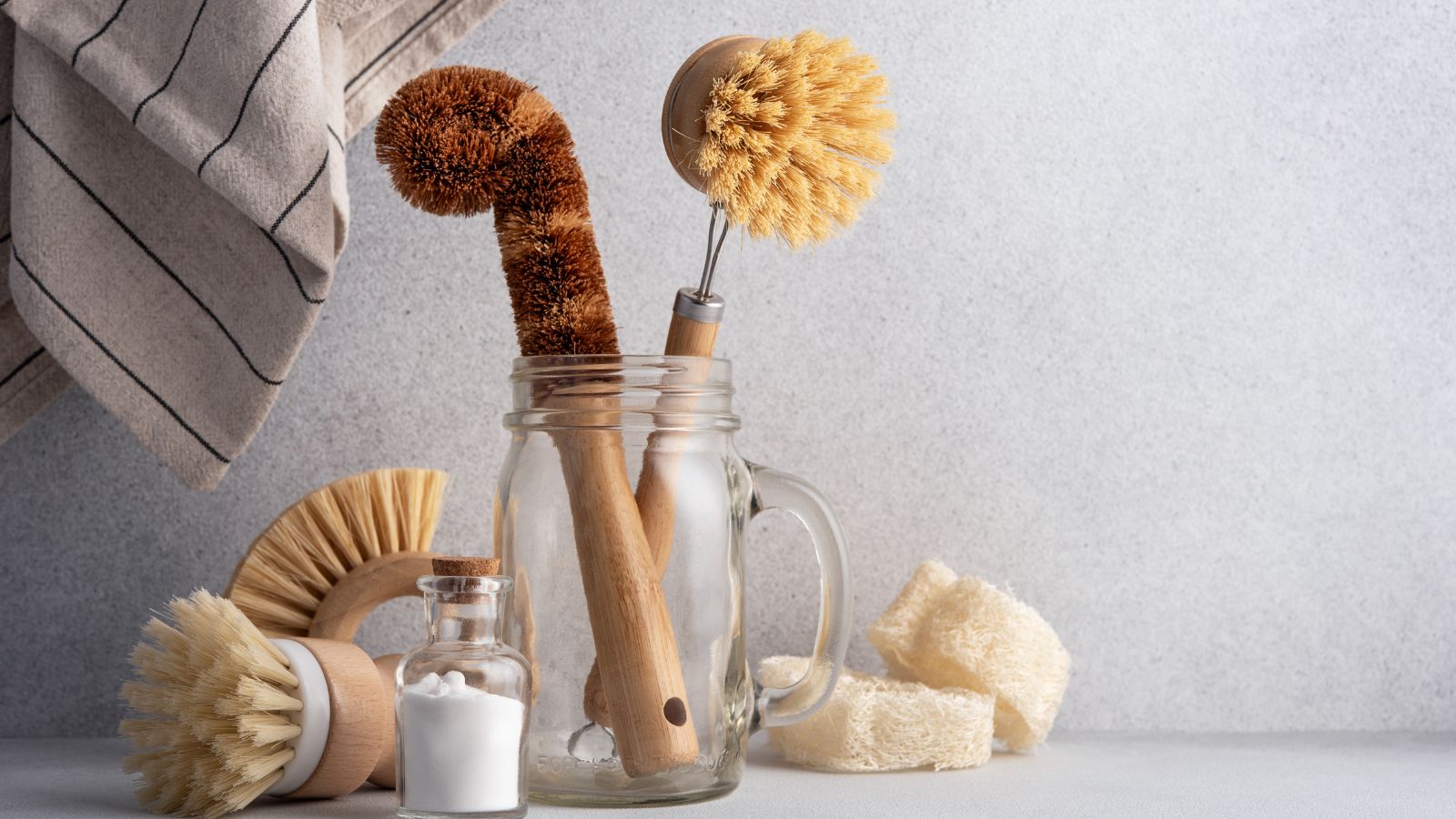
Design expertise in your inbox – from inspiring decorating ideas and beautiful celebrity homes to practical gardening advice and shopping round-ups.
You are now subscribed
Your newsletter sign-up was successful
Want to add more newsletters?

Twice a week
Homes&Gardens
The ultimate interior design resource from the world's leading experts - discover inspiring decorating ideas, color scheming know-how, garden inspiration and shopping expertise.

Once a week
In The Loop from Next In Design
Members of the Next in Design Circle will receive In the Loop, our weekly email filled with trade news, names to know and spotlight moments. Together we’re building a brighter design future.

Twice a week
Cucina
Whether you’re passionate about hosting exquisite dinners, experimenting with culinary trends, or perfecting your kitchen's design with timeless elegance and innovative functionality, this newsletter is here to inspire
Dish sponges and dish brushes are common household cleaning tools that most people seem to have, even if they only reach for one or the other.
I'm one of those people, where one of these essential cleaning tools is currently living in my sink, gathering grime, rather than being put to use. But cleaning experts say I should bin my sponge, and stick with the dish brush as it's cleaner. Do you agree?
To determine which one truly comes out on top, I spoke to a panel of cleaning experts to hear which of these is the winner. It's safe to say I'm ditching my sponge now.
Which is better, dish sponge or dish brush?
Dish sponge: Pros and cons
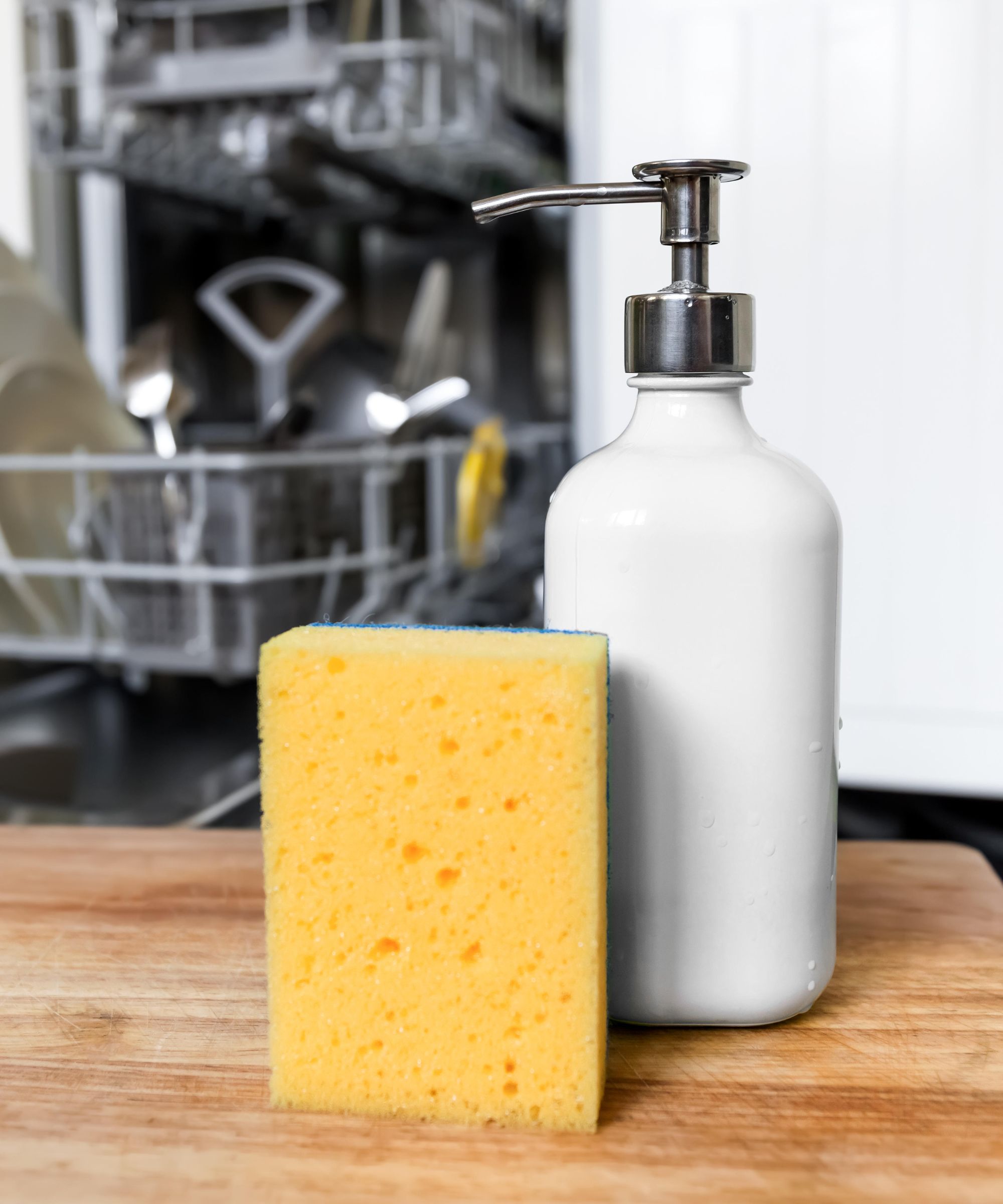
Dish sponges have been around since the dawn of time, loved for their flexibility and simplicity. However, they aren't without their downsides.
Muffetta Krueger, professional cleaner and owner of Muffetta's Housekeeping, breaks down the pros and cons, and shares cleaning tips for a sponge's best uses.
Pros of dish sponges
- Soft and flexible: 'Dish sponges are gentle on delicate, high-touch surfaces you should always clean and items like glassware, nonstick pans, and fine china. Their ability to conform to the shape of an object makes them ideal for wiping down curved surfaces and inside mugs or bowls.'
- Great for surface wiping: 'The flat, absorbent surface makes dish sponges excellent for wiping down countertops, cleaning glass stove tops, and even spills. A damp sponge does double duty as a scrubber and a cloth.'
- Widely available and inexpensive: 'You can find dish sponges just about anywhere. They’re cheap to replace (and should be replaced often), so people see them as a practical staple.'
- Some versions have dual textures: 'Many sponges have a soft side and a scrubby side, allowing for both delicate cleaning jobs and tackling the hardest household cleaning tasks with one tool.'
We're big fans of Scrub Daddy sponges, available at Walmart. Run them under cold water and they remain stuff, but run them under warm water and they become malleble and soft. Perfect!
Cons of dish sponges
- Bacteria hotbeds: 'Sponges retain moisture and organic matter, making them prime territory for bacterial growth and a hotspot for germs. Studies have shown that even with regular rinsing, sponges can harbor more bacteria than a toilet seat. Gross but true.' Learn how to clean a kitchen sponge to reduce the risk of contamination.
- Short lifespan: 'Because of how quickly sponges become unhygienic, they need to be replaced often. A sponge should honestly be swapped out every week — and most people don’t switch them.'
- Absorbs odors: 'A sponge that’s even slightly old tends to begin making your kitchen smell bad — it absorbs grease, moisture, and food particles, which break down and create foul odors.'
- Doesn't reach into tight spaces well: 'Sponges are flat and stubby. They can't get deep into bottles, narrow glasses, or utensil slots.'
Dish brush: Pros and cons
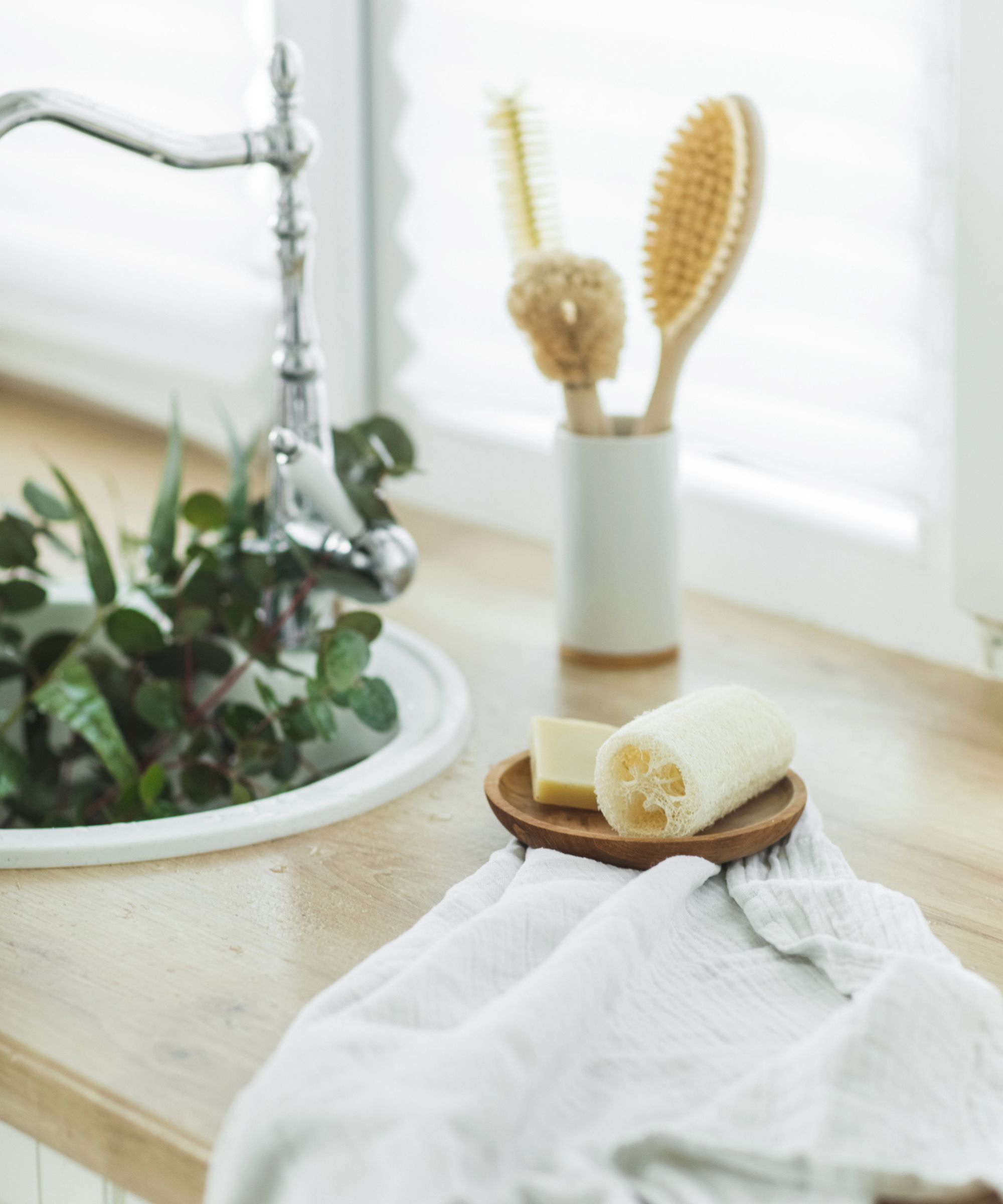
For those of us who detest getting our hands dirty in grime-infested sink water, dish brushes with their long handles can seem like a saviour, but there are some cons, too.
Design expertise in your inbox – from inspiring decorating ideas and beautiful celebrity homes to practical gardening advice and shopping round-ups.
Here, Karina Toner, professional cleaner and operations manager at Spekless, breaks down the pros of the trusty dish brush, and Muffetta delves into the cons.
Pros of dish brushes
- Brushes are easy to clean: ' The bristles don’t hold onto moisture the way sponges do, so they dry faster and stay cleaner.'
- Brushes are simple to rinse: 'You can rinse dish brushes off quickly, and they don’t need to be tossed out or replaced until three or four months have passed, permitted they are in good condition and don't smell.' This top tip for washing dishes can cut your chore time in half, as you're not dealing with a gunk-filled sponge.
- They are versatile: 'If you get a dish brush with a good grip and solid bristle tension, it can handle everything from delicate glassware to baked-on casserole dishes.'
This affordable trio of popular dish brushes from Walmart are just the ticket.
Cons of dish brushes
- They can be less effective on flat, curved or soft surfaces: 'A brush can sometimes be too aggressive for delicate dishes. It might leave marks on Teflon or not conform well to flat surfaces, missing spots unless you angle it just right.'
- Dish brushes can fling water around during use: 'Vigorous scrubbing sometimes leads to water droplets flinging around, especially with stiffer bristles – something users either learn to control or tolerate.' This can lead to other items or areas in your kitchen developing water stains if you're not careful. Learn how to remove common stains from every type of countertop and how to get hard water stains off of glass to keep your counters, tiles, and stovetops in top form.
- They take up more space: 'Brushes don’t store as neatly on the edge of the sink, so having the added visual clutter is something people with tidy kitchens never do or may generally choose to avoid. Some people don’t like having them standing in a cup or lying out where water can drip.'
The verdict

Our two cleaning experts unanimously agree that dish brushes come out on top on the ultimate cleaning supplies checklist, even though sponges aren't without their pro points. Do you agree? Let us know in the comments section below!
The main factor driving the pros' decision is how dish brushes are the far more hygienic option out of the pair, as well as how a good quality one will last you much longer than an old, smelling, disintegrating sponge.
'Honestly, I get the appeal. Sponges are a classic. They’re familiar, they’re soft, squishy, and you can really get in there with them,' says Karina. 'But keeping hold of them is a bad cleaning habit: sponges trap everything they touch – food bits, grease, bacteria – and unless you’re replacing them constantly (which most people don’t), they turn into little germ farms sitting by your sink. I'm definitely on team dish brush here. You don't need both.'
Muffetta agrees, sharing, 'Let’s not dance around it – the dish brush is the clear winner. It’s cleaner, smarter, and simply better designed for modern kitchen ideas. If you’re still clinging to a sponge, I get it – it’s familiar. But familiar doesn’t mean sanitary.'
Below are Muffetta's top four reasons why dish brushes will always have the edge over dish sponges as a cleaning tool:
- They don't sit in a puddle of their own bacteria: 'Sponges stay wet. Bacteria thrive in warm, moist environments. The brush? It dries quickly and stays elevated — no damp breeding ground here.' This makes dish brushes better when seeking to create a healthy 'home microbiome'.
- They give you reach and power: 'Try scrubbing the bottom of a tall thermos or cleaning a charcoal grill with a sponge. You’ll be wrist-deep in grime. The brush gives you leverage and precision without sacrificing your dignity.'
- They last: 'A high-quality dish brush can go weeks — even months — without needing replacement. Try that with a sponge and you’ll be serving mold with your dinner.'
- They keep your hands cleaner: 'No more squeezing out foul-smelling gunk or wondering if you just touched a week-old meatball smear. The handle of a dish brush gives you distance and control.'
Which team are you on? Have our cleaning experts persuaded you to banish your kitchen sponge? Let us know in the comments below, we'd love to hear which one is a winner for your household!
Cleaning essentials
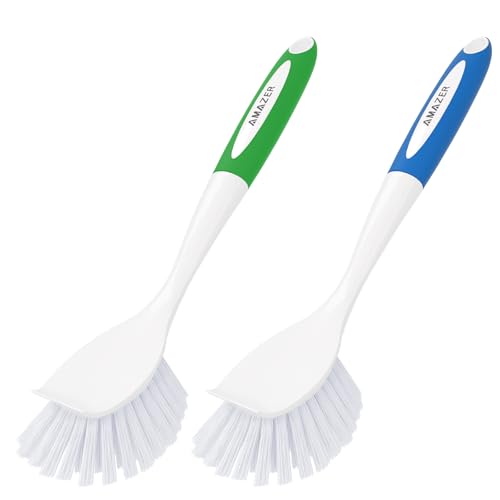
This dish brush duo is a fantastic budget-friendly option if you're looking for durable dish brushes with sturdy handles.
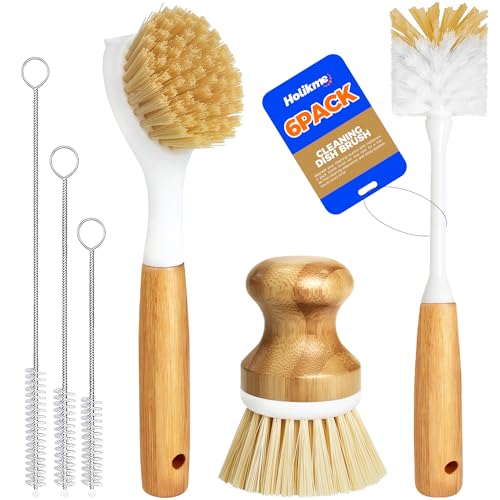
This amazing set of dish brushes will ensure cleaning any tricky crevice becomes a breeze.
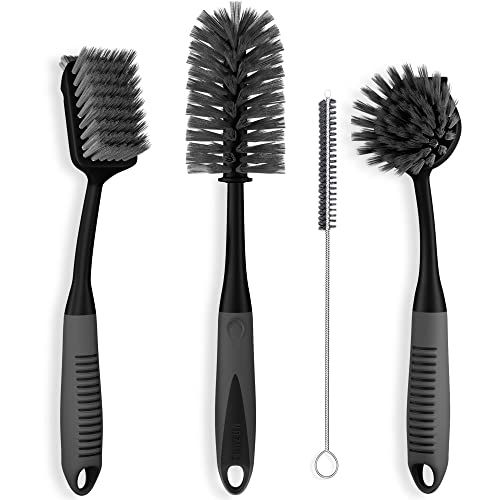
If you're looking for a reliable set of dish brushes to match the aesthetic of your kitchen, look no further.
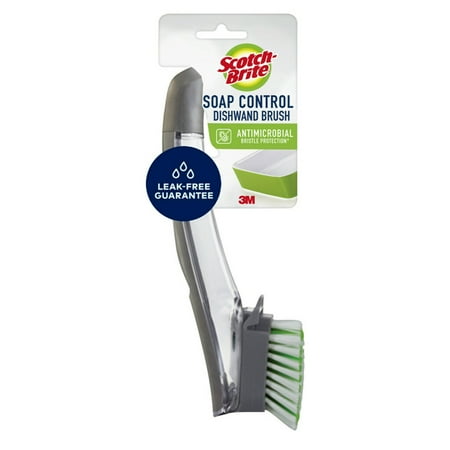
This clever dish brush will automatically detect when you need more soap and dispense more onto your dishes.
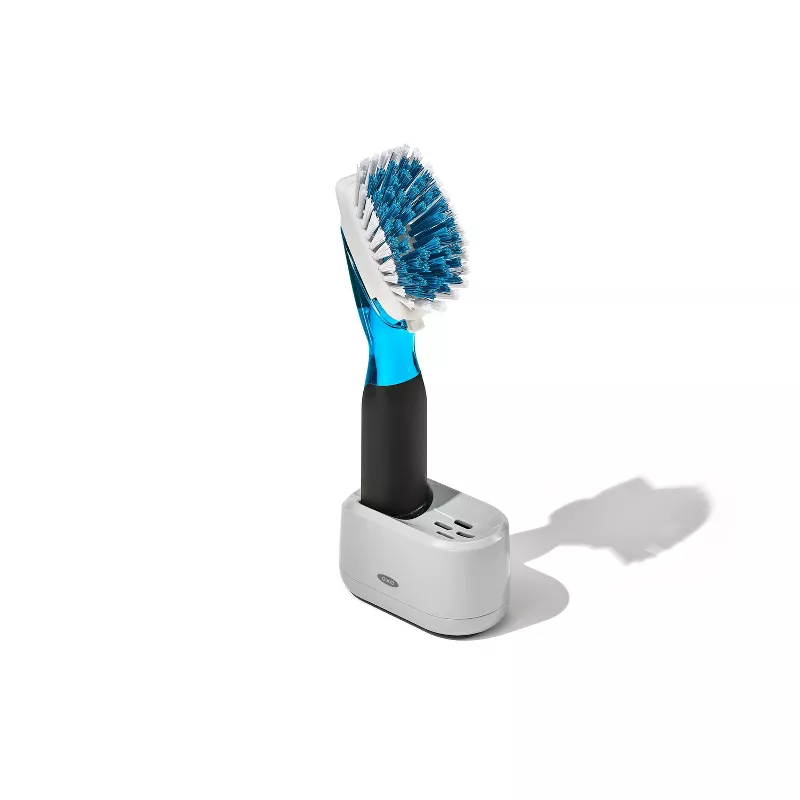
This dish brush comes with its own handy stand, giving it a place to live and ensuring water can drain out of the bristles.
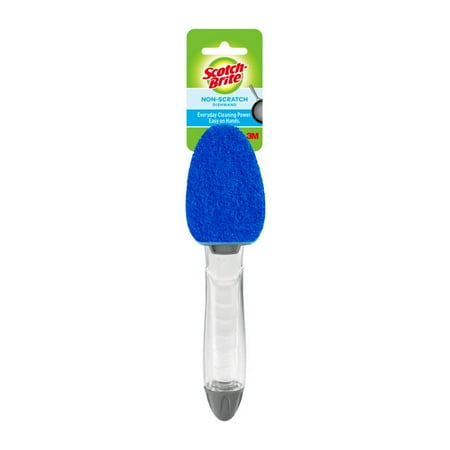
If you're still struggling to swap your sponges, we recommend trying one like this on the end of a brush. This way, you'll see how much easier brushes are to use!
Meet the experts

Karina has been a professional cleaner and operations manager at Spekless Cleaning, one of the top-rated cleaning companies in D.C, for over six years. With a strong commitment to quality, Spekless proudly serves over 10,000 customers each year across Washington, D.C., Virginia and parts of Maryland, setting the standard for excellence in the cleaning industry.

Muffetta Krueger is the founder of Thorough Cleaning and Concierge (still thriving under new ownership) and the Muffetta Brand, which encompasses both a line of natural cleaning products and a renowned housekeeping service (Muffetta’s Housekeeping). She has been working in the domestic service business for over 15 years.
If you're wondering what other simple switches can make your home more healthy, looking into swapping for non-toxic kitchen supplies will make a great difference.
For instance, here you can learn how to pick an easy-to-clean non-toxic cutting board that's efficient and kinder to your health.

Ciéra is a writer and regional laureate with particular passions for art, design, philosophy and poetry. As well as contributing to Homes & Gardens, she's an Editorial Assistant for Design Anthology UK and a contributing writer for magazines including Livingetc, Apartment Therapy, House Beautiful and Ideal Home. Previous commendations of hers include being Highly Commended by The Royal Society of Literature and receiving a prestigious MA Magazine Journalism scholarship to City, University of London.